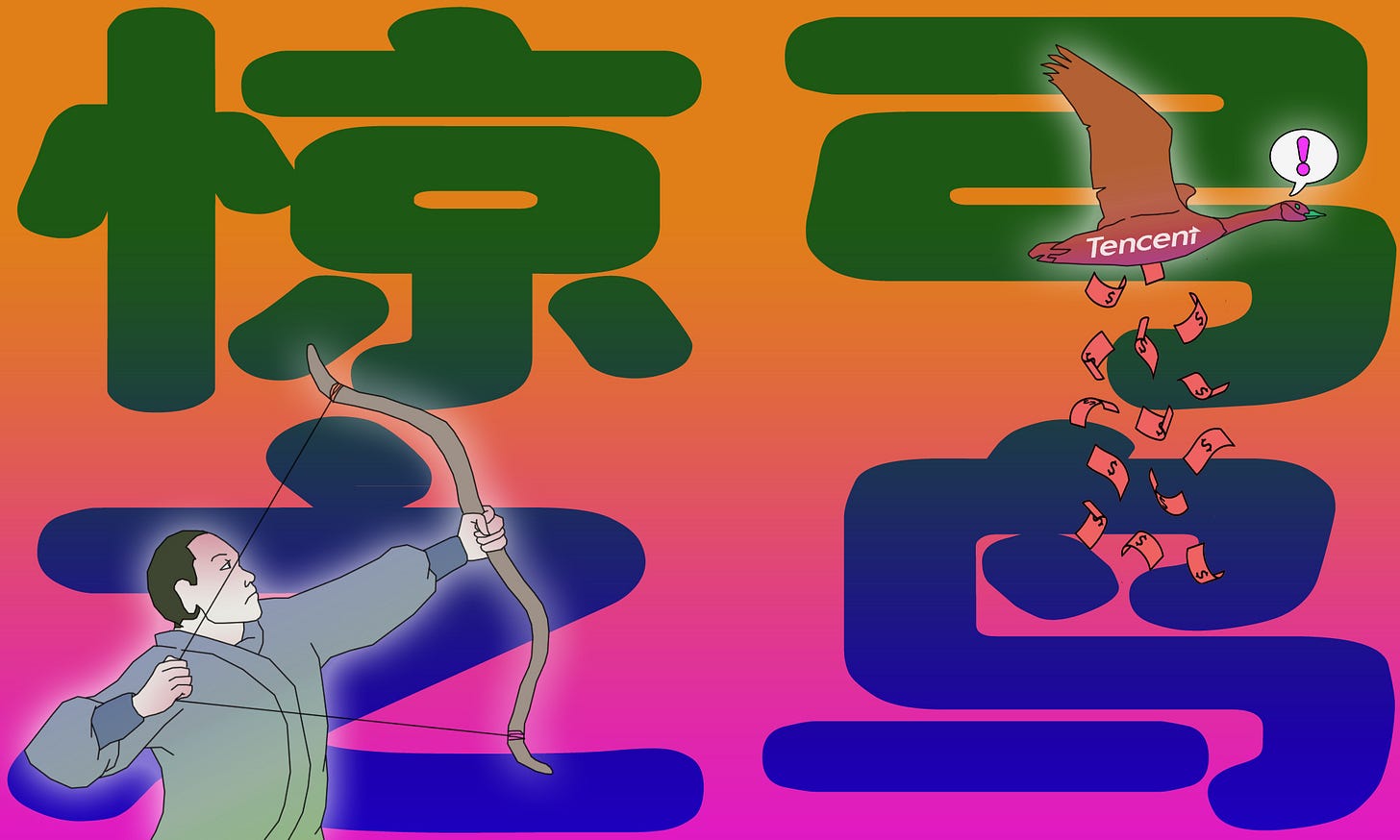Welcome to RealTime Mandarin—a multimedia resource to immerse you in the latest Chinese language trends, inspire you to practice and improve your Mandarin every week, and empower you to communicate with confidence.
Subscribe now to get the next issue straight to your inbox!
Chinese regulators announced on 22 December proposed rules to curb spending and rewards in video games.
The National Press and Publication Administration 国家新闻出版署, the regulator since 2018, issued the notice to publicly solicit opinions.
The document, Online Games Management Draft Measures for Comments (网络游戏管理办法草案征求意见稿) is 11,259 characters long, has 64 articles, and proposes stricter measures in online game approvals, content management, issuance and trading of game currencies and virtual props, publicity and promotion of games, and protection of minors.
If implemented, the new rules would curb “predatory transactions” (诱导性消费) in games:
Including banning enticing in-game rewards for daily login, first-time recharge, and continuous recharges.
网络游戏不得设置每日登录、首次充值、连续充值等诱导性奖励。
How was the reaction?
One industry executive was asked by 21st Century Business Herald what he thought of the draft. After a long period of silence, he replied:
"Difficult for me to tell. Why don’t you take a look at the market response?"
21世纪经济报道问一家游戏上市公司高管对征求意见稿有什么看法,在较长时间的沉默后,他回复记者:我不好讲,你直接看市场反馈吧。[4]
And respond the market did.
By the afternoon of 22 December, gaming company stocks, including Tencent, Xindong, China Mobile Games, all fell by more than 10%, with NetEase falling by over 20%.
Nearly $80 billion alone in market value was wiped from Tencent 腾讯 and NetEase 网易, China's two biggest gaming companies.
The timing did not go unnoticed with superstitious investors.
The announcement fell on the Winter Solstice (冬至), the darkest day of the year, and a festival in the Chinese lunar calendar.
Yesterday happened to be the "winter solstice", so the phrase “winter is coming again” was used to describe what happened. But many people in the gaming industry have become accustomed to "living in winter" and were not surprised. The market turmoil mostly came from outside the industry. [5]
昨日恰逢“冬至”节气,有不少人用“又遇寒冬”来形容行业昨天的遭遇。但事实上,身处游戏业之中的许多人已经习惯于“过冬”了,表现得大多相对淡定,剧烈的市场应激反应更多来自行业外部。[5]
Investors and the markets have been spooked by government before:
In August 2021, the "Economic Information Daily", run by Xinhua News Agency, published an article titled "The industry of 'Spiritual Opium' now worth hundreds of billions".
At that time, this article had a direct impact on the stock prices of many game-related stocks. Since then media described the gaming industry as "a bird frightened by the sound of a bow".
2021年8月,由新华社主管主办的《经济参考报》曾刊登了一篇文章,名为《“精神鸦片”已长成数千亿产业》。当时这篇文章在一天之内对诸多游戏相关企业的股价产生直接影响,不少媒体开始将游戏行业形容为“惊弓之鸟”。
A month before that, in July 2021, the Chinese government launched “Double Reduction Policy” (双减政策). Its devastating impact on China’s education sector is still fresh in the memory of investors, who interpreted the draft measures as potentially having the same impact on the gaming sector.
So, that's what we explore this week!
Favourite Five
1. 管 guǎn
interfere, meddle
这种管制细到连游戏公司怎么做促销,都管上了,是一种严格的干预手段 - This control is so granular that it even dictates how game companies should conduct promotions. It's a strict intervention. [3]
Note: Usually translated "manage" or "control." But here I've translated it as "meddle with." Read more about the subtle translations of common phrases in Chinese in this excellent post by Geremie Barme.
Related:
管制 guǎn zhì - control, restriction
多头管理 duōtóu guǎnlǐ – a situation where someone has to report to several managers
2. 课金 kè jīn
spending money in online games
新闻同时震动了疫情后盼望产业回暖的游戏产业从业人员和往常批判“氪金”游戏的玩家 - The news shocked both gaming industry professionals who hope for a revival after the pandemic and players who usually criticize games that encourage in-app purchases. [2]
Background: Originally from Japanese.
Related:
氪金 kè jīn – getting conned into spending money (坑钱) in online games (internet slang)
4. 精神鸦片 jīng shén yā piàn
spiritual opium
《经济参考报》曾刊登了一篇文章,名为《“精神鸦片”已长成数千亿产业》 - The Economic Information Daily once published an article titled "The industry of 'Spiritual Opium' now worth hundreds of billions". [5]
Background: A controversial phrase we first explored in August 2021.
4. 惊弓之鸟 jīng gōng zhī niǎo
a bird startled by the sound of a bow
不少媒体开始将游戏行业形容为“惊弓之鸟” - Many media outlets have begun to describe the gaming industry as "a bird frightened by the sound of a bow". [5]
Related:
一朝被蛇咬,十年怕井绳 yī zhāo bèi shé yǎo, shí nián pà jǐng shéng - Bitten by a snake on one day, afraid of the straw rope for ten years; once bitten twice shy
5. 寒蝉效应 hán chán xiào yìng
chilling effect
在近年来的种种“行业整顿”背景下,草案释放的信号已足够产生寒蝉效应 - Against the backdrop of various "industry rectifications" in recent years, the signals released by the draft are enough to create a chilling effect. [2]
Background: A translation of the English legal term, "the chilling effect", which means the inhibition or discouragement of the legitimate exercise of natural and legal rights by the threat of legal sanction.
Consuming the Conversation
Useful words
6. 打赏 dǎ shǎng
give reward, tip
网络游戏直播不得出现未成年人打赏情况 - Minors may not give rewards or tips in online game live-streams. [1]
Note: A common internet term. Users, players, social media fans can provide tips or rewards (money) via games or even on social media and live-stream broadcast rooms.
7. 严苛 yán kē
strict, stringent
仅就内容而言,并无太多更严苛的规范 - If you just look at the content, not many rules are too stringent. [1]
8. 动荡 dòng dàng
turmoil, unrest
之所以能够引发大规模股市动荡与从业者的讨论,重点恐怕也并不在文本本身 - It is probably not the content of the draft regulation that triggered widespread stock market turmoil and discussions in the industry. [1]
9. 急泻 jí xiè
sharp decline, rapid sell-off
直接引发次日包括腾讯、网易在内的多支中资游戏股急泻,市值蒸发过百亿美元 - It directly triggered a plummet in many Chinese game stocks, including Tencent and NetEase, with tens of billions of dollars evaporated from the stock market. [2]
Related:
大跌 dà diē - significant drop
一字跳水 yī zì tiào shuǐ - stock prices take a nosedive
10. 喇叭 lǎ ba
loudspeaker; what is said
怎么喇叭和行动是完全两个方向?该信什么 - Why is their action going in a completely different direction from their words? What should we believe? [3]
Note: A metaphor for government announcement or commitment.
11. 吸睛 xī jīng
eye-catching, attention-grabbing
这类的法案,很吸睛,也很迎合民粹 - Laws of this kind are very eye-catching and welcomed by the populists. [3]
Related:
民粹 mín cuì - populism
12. 吐槽 tǔ cáo
criticize humorously
这条和相关条目被不少业内人士吐槽以政策方式限制游戏企业正当牟利 - This and related clauses have been criticized by many industry insiders as a policy aimed at limiting the legitimate profits of gaming companies. [4]
Three-character phrases
13. 宅经济 zhái jīng jì
stay-at-home economy
疫情期间,游戏产业得益于人们困在家里渴望娱乐和陪伴的需求,和短视频一起从“宅经济”分到一杯羹 - During the pandemic, the gaming industry benefited from people's need for entertainment and companionship while stuck at home, grabbing a share from the "stay-at-home economy" along with short videos. [2]
14. 浇冷水 jiāo lěng shuǐ
pour cold water, dampen enthusiasm















